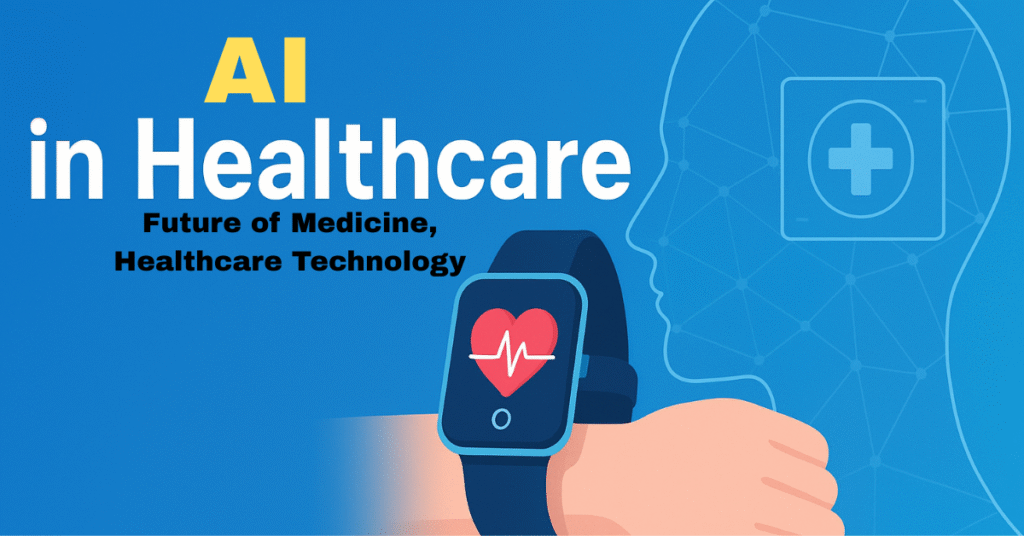Introduction
Today we will talk about how AI in healthcare: smart wearables & diagnosis is changing the future of medicine. Than now imagine wearing a small watch that not only tracks your heart rate but also predicts health risks before they even appear. That’s not science fiction anymore, it’s the power of AI in healthcare. From smart wearables that monitor daily activities to AI-driven diagnosis tools that help doctors detect diseases faster, technology is shaping the future of medicine.

In this post, we’ll explore how AI-powered wearables and intelligent diagnosis systems are transforming the way we care for our health.
1. What Are Smart Healthcare Wearables?
Smart wearables are devices like smartwatches, fitness trackers, and health bands that use AI algorithms to collect and analyse health data.
They can track:
- Heart rate & blood pressure
- Oxygen levels & sleep cycles
- Calories burned & daily activity
AI makes these devices more than just trackers. they become personal health assistants, alerting users when something unusual happens.
2. AI in Diagnosis: A Game Changer for Doctors
Traditionally, diagnosis relied on lab reports and manual analysis. Now, AI tools can scan medical images, study patient history, and suggest possible conditions in seconds.
For Examples:
- AI systems detecting cancer at an early stage.
- Smart tools analysing X-rays & MRIs faster than humans.
- Virtual assistants helping doctors make quick decisions.
This reduces human error and makes healthcare faster, cheaper, and more accurate.
3. Benefits of AI in Healthcare
Here’s why AI is becoming a must-have in the medical world:
- Early Detection: Catch diseases before they become dangerous.
- Remote Health Monitoring: Track patients from home.
- Personalized Treatment: AI suggests custom treatment plans.
- Fewer Hospital Visits: Smart wearables help people manage health at home.
4. Challenges and Concerns
Of course, every technology comes with challenges:
- Data Privacy: Who owns your health data?
- Cost: Not everyone can afford high-tech devices.
- Accuracy: AI is powerful, but it’s not perfect yet.
Healthcare leaders are working to make AI safer, more affordable, and more trustworthy.
5. The Future of AI in Healthcare
Experts believe that in the near future:
- Every patient will have a personal AI health assistant.
- Hospitals will use AI for faster emergency response.
- Smart wearables will become as common as smartphones.
The journey has just started and AI is making healthcare smarter every day.
Conclusion
AI in healthcare is not just about machines, it’s about saving lives, improving health, and giving people more control over their well-being. From smart wearables to diagnosis systems, AI is shaping a healthier tomorrow.
👉 What do you think? Would you trust an AI-powered wearable to monitor your health?
The main purpose of this post is to educate you. This post is written and reviewed by Rajeev Kumar, a passionate blogger in AI tools and cybersecurity
You may have missed
AI for students: “Best AI Tools for Students”.
AI productivity & work: “Top AI Tools for Professionals”.
AI companions & chatbots: “Best AI Chatbots You Should Try”.
AI-powered Future Jobs devices: “AI Tools Revolutionizing Future Jobs ”.
AI Powered Future of ChatGPT 5: “future AI devices”.
FAQ
1. What is the role of AI in healthcare?
AI helps doctors and patients by analyzing medical data, predicting diseases, and offering faster, more accurate diagnoses. It also powers smart wearables that monitor health in real time.
2. How do smart healthcare wearables work?
Smart wearables use sensors to track body functions like heart rate, sleep, and oxygen levels. AI algorithms analyze this data and provide useful insights or alerts when something is wrong.
3. Can AI replace doctors in the future?
AI will not replace doctors but will support them. It acts as a powerful assistant, helping doctors detect diseases earlier, reduce errors, and make better treatment decisions.
4. Are AI healthcare devices safe?
Most AI-powered wearables and diagnostic tools are safe and tested. However, data privacy and accuracy are important concerns. Users should always choose trusted brands and certified devices.
5. What is the future of AI in healthcare?
In the future, AI will make healthcare more personalized, affordable, and accessible. Smart wearables may become a daily necessity, and AI-powered diagnosis will be a standard in hospitals worldwide.